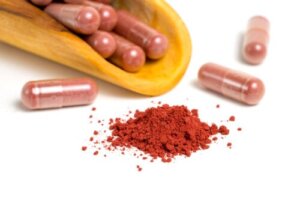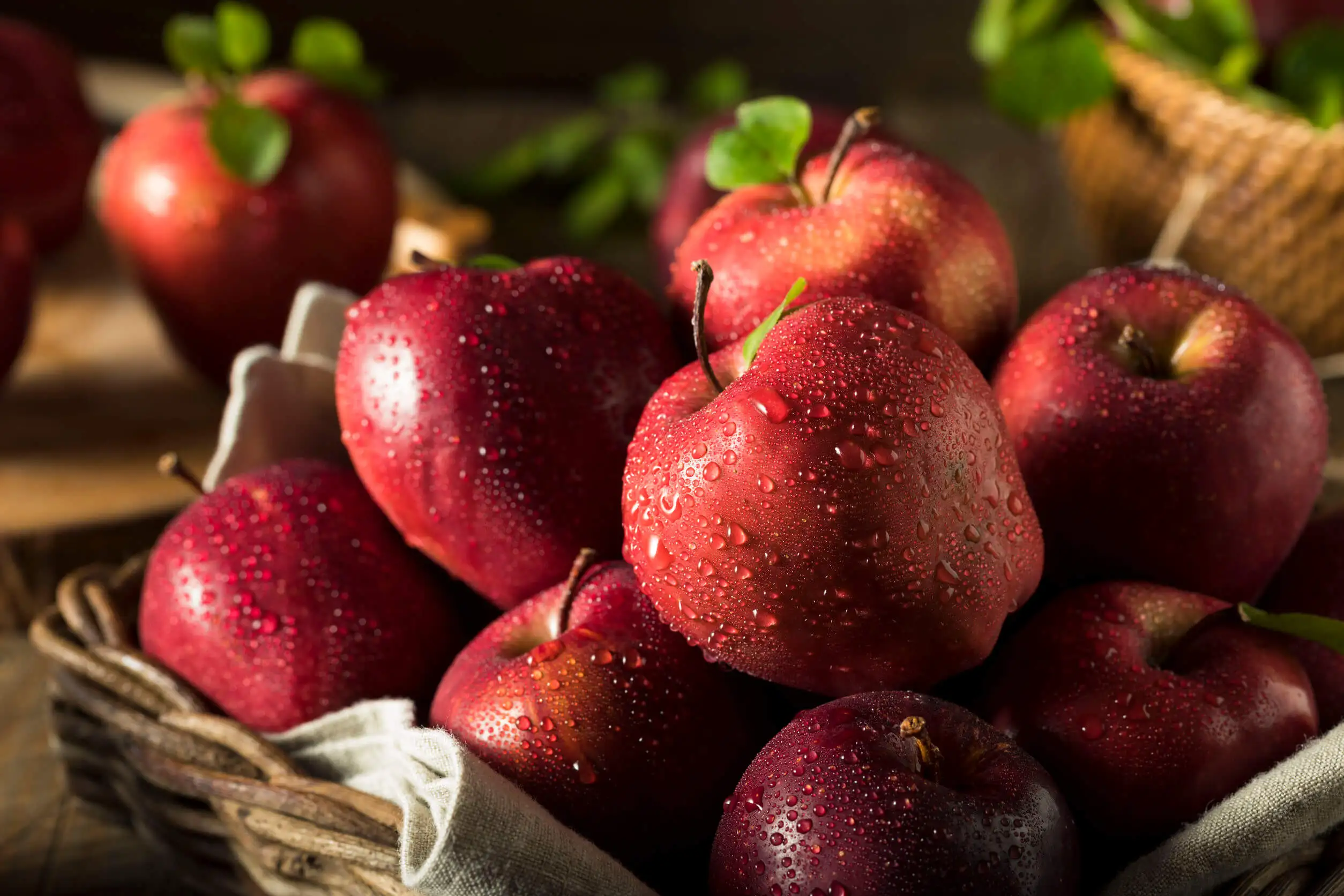Learn About Quercetin: Benefits, Uses, Sources and More

Do you know the benefits of quercetin? It’s a natural phytochemical that you can find in a wide variety of plants and foods. While it plays a major role as a pigment, it’s also noted for its potential to promote physical and mental well-being.
In particular, and as detailed in an article in the scientific journal ACS Omega, it has promising bioactive effects, acting as an anti-diabetic, antioxidant, anti-inflammatory, wound healing, and cardiovascular agent.
In fact, its potential for the prevention and treatment of several diseases is being studied right now. What does science say about it? What are its main sources? In the following article, we’ll answer these questions.
What is quercetin?
Quercetin is a plant pigment that belongs to the group of flavonoids. It’s responsible for giving color to various fruits, flowers, and vegetables. However, beyond this, it’s valued for its antioxidant and anti-inflammatory qualities. Its name comes from the Latin word quercetum, meaning “oak forest”.
Although its bioavailability was underestimated in the past, it’s now known to be relatively higher than that of other phytochemicals. In addition, it’s estimated to be the most abundant flavonoid in our diets, with an average person consuming 10 to 100 mg per day through food (there are more than 20 food sources that contain it).
Benefits and uses of quercetin
For several decades, researchers have considered quercetin to be of great biological importance due to its antioxidant capacity. As a publication in Pharmacognosy Reviews explains, this type of flavonoid plays an important role in protecting cells against damage caused by free radicals.
Free radicals are unstable molecules that are linked to the development of a wide variety of chronic diseases. Their excessive production alters cellular functions and leads to the development of cardiac, metabolic and neurodegenerative disorders. So how does quercetin help? Let’s see!
Read also: Types of Antioxidants: Properties and Uses
Reducing inflammation
Many chronic diseases are related to chronic inflammation. In turn, it has been determined that the presence of high levels of free radicals activates inflammatory genes and leads to an inordinate response.
In this regard, quercetin supplementation is beneficial, as its antioxidant potential inhibits the negative effects of free radicals. Similarly, it reduces markers of cellular inflammation.
In this regard, The American Journal of Clinical Nutrition reported that, in research, quercetin attenuated the expression of inflammatory genes, including tumor necrosis factor-alpha (TNFα) and interleukin-6 (IL-6) molecules.
Meanwhile, research in the Journal of the American Nutrition Association detailed that supplementation with 500 mg quercetin daily for 8 weeks reduced inflammatory markers in women with rheumatoid arthritis. This was linked to a decrease in stiffness and pain.

Cardiovascular health care
One of the reasons quercetin contributes to cardiovascular health care is its ability to relax blood vessels. Because of this, its intake helps reduce the risk of high blood pressure.
Research shared in the Journal of Pharmacology and Experimental Therapeutics reported that this flavonoid has vasodilatory effects and helps lower high blood pressure. This was also corroborated in a recent review shared in the Journal of the American Heart Association, which established that the consumption of 500 mg of quercetin per day was useful in reducing systolic and diastolic blood pressure by an average of 5.8 mm Hg and 2.6 mm Hg, respectively.
In turn, information shared in the European Journal of Medicinal Chemistry suggests that quercetin also inhibits oxidation of bad cholesterol (LDL), which is key to controlling cardiovascular risk.
Prevention of neurodegenerative disorders
Antioxidants play an important role in reducing the risk of neurodegenerative disorders. Quercetin, in particular, has been recognized as a neuroprotectant.
A study shared in Oxidative Medicine and Cellular Longevity states that this substance stimulates natural defenses against oxidative stress and decreases the risk of Alzheimer’s disease and dementia.
Relief of allergy symptoms
The anti-inflammatory activity of quercetin has positive effects in combating allergies. In Iranian Journal of Allergy, Asthma and Immunology. it was reported that this antioxidant helped control peanut-related anaphylactic reactions in mice.
Meanwhile, other research found that it helps suppress chemicals that promote inflammation, such as histamine. It’s unclear at this time whether these same effects would occur in humans.
Antitumor properties
Quercetin is not an alternative cure for cancer. It should by no means replace medical treatments against this disease. However, evidence suggests that it plays a preventive role against chronic disorders associated with oxidative stress and inflammation, such as neoplasms.
Research in the journal Plos One found that this phytochemical helps to significantly inhibit the proliferation of cancer cells. To be more precise, test tube and animal studies associate this substance with cancer prevention in the following tissues:
Prevention of premature aging
Aging is a biological process that cannot be stopped. However, constant exposure to free radicals accelerates it. Fortunately, natural substances such as quercetin can help stop or slow it down.
A study in Nature Medicine associates its uptake with increased life expectancy in old age. It also suggests that it helps protect cells and reduce aging markers.
Similar results were reported in another study in The American Journal of Chinese Medicine, which concluded that quercetin exerts restorative benefits on human dermal fibroblasts.
Controlling blood sugar levels
In several studies, quercetin has shown benefits in lowering blood glucose levels. A literature review shared in Biomedicine and Pharmacotherapy details that this flavonoid has anti-diabetic potential and may reduce the risk of complications associated with diabetes.

Risks and possible side effects of quercetin
While quercetin is known for its many benefits, it isn’t without some side effects, especially when taken as a supplement. A report in Molecular Nutrition and Food Research details that intake of more than 1000 mg per day can result in the following symptoms:
- Upset stomach
- Headaches
- A tingling sensation
- Nausea
However, in most cases it’s considered safe and does not cause complications.
The best way to consume it is through foods that contain it. However, if taken in supplements, it should be avoided in the following cases:
- Pregnant and lactating females
- People taking antibiotic treatment
- People taking medication for high blood pressure
- People with diagnosed chronic diseases (consult your doctor first)
It’s essential to take into account that most of the studies on quercetin have been carried out on animals or in the laboratory. Therefore, it isn’t possible to state with any certainty that it causes significant benefits in humans. This is why it shouldn’t be a first-choice treatment.
Main sources of quercetin
Quercetin provides many benefits when obtained through certain foods. It’s often concentrated in the peel or outer layer. The main sources are as follows:
- Broccoli
- Cherries
- Tomatoes
- Shallots
- Kale
- Red grapes
- Capers
- Green and black tea
- Red apples
- Red leaf lettuce
- Peppers (yellow and green)
- Onions (red and white)
- Berries (cranberries, blueberries, blueberries, and raspberries)
The amount of quercetin varies in each foodstuff, and sometimes depends on growing conditions. However, it’s also available in commercial supplements, either in capsule or powder form.
Suggested doses are usually between 500 and 1000 mg per day. For optimal absorption, simultaneous consumption with vitamin C or enzymes such as bromelain is indicated.
Read more here: Cassis or Blackcurrant: Uses, Nutrition, and Properties
What should we remember about quercetin and its benefits?
Quercetin is one of the most recommended flavonoids for promoting good health. Evidence suggests that it has anti-inflammatory and antioxidant potential. In this way, it plays a role in the prevention of several diseases.
Although it’s available as a supplement, it’s best obtained through the diet. Many foods contain it and, incidentally, these provide other essential nutrients.
All cited sources were thoroughly reviewed by our team to ensure their quality, reliability, currency, and validity. The bibliography of this article was considered reliable and of academic or scientific accuracy.
- Anand David, Alexander Victor et al. “Overviews of Biological Importance of Quercetin: A Bioactive Flavonoid.” Pharmacognosy reviews vol. 10,20 (2016): 84-89. doi:10.4103/0973-7847.194044
- Bischoff SC. Quercetin: potentials in the prevention and therapy of disease. Curr Opin Clin Nutr Metab Care. 2008 Nov;11(6):733-40. doi: 10.1097/MCO.0b013e32831394b8. PMID: 18827577.
- Anand David, Alexander Victor et al. “Overviews of Biological Importance of Quercetin: A Bioactive Flavonoid.” Pharmacognosy reviews vol. 10,20 (2016): 84-89. doi:10.4103/0973-7847.194044
- Hunter P. The inflammation theory of disease. The growing realization that chronic inflammation is crucial in many diseases opens new avenues for treatment. EMBO Rep. 2012 Nov 6;13(11):968-70. doi: 10.1038/embor.2012.142. Epub 2012 Oct 9. PMID: 23044824; PMCID: PMC3492709.
- Boots AW, Haenen GR, Bast A. Health effects of quercetin: from antioxidant to nutraceutical. Eur J Pharmacol. 2008 May 13;585(2-3):325-37. doi: 10.1016/j.ejphar.2008.03.008. Epub 2008 Mar 18. PMID: 18417116.
- Chuang CC, Martinez K, Xie G, Kennedy A, Bumrungpert A, Overman A, Jia W, McIntosh MK. Quercetin is equally or more effective than resveratrol in attenuating tumor necrosis factor-{alpha}-mediated inflammation and insulin resistance in primary human adipocytes. Am J Clin Nutr. 2010 Dec;92(6):1511-21. doi: 10.3945/ajcn.2010.29807. Epub 2010 Oct 13. PMID: 20943792.
- Javadi F, Ahmadzadeh A, Eghtesadi S, Aryaeian N, Zabihiyeganeh M, Rahimi Foroushani A, Jazayeri S. The Effect of Quercetin on Inflammatory Factors and Clinical Symptoms in Women with Rheumatoid Arthritis: A Double-Blind, Randomized Controlled Trial. J Am Coll Nutr. 2017 Jan;36(1):9-15. doi: 10.1080/07315724.2016.1140093. Epub 2016 Oct 6. PMID: 27710596.
-
Patel RV, Mistry BM, Shinde SK, Syed R, Singh V, Shin HS. Therapeutic potential of quercetin as a cardiovascular agent. Eur J Med Chem. 2018 Jul 15;155:889-904. doi: 10.1016/j.ejmech.2018.06.053. Epub 2018 Jun 27. PMID: 29966915.
- Costa LG, Garrick JM, Roquè PJ, Pellacani C. Mechanisms of Neuroprotection by Quercetin: Counteracting Oxidative Stress and More. Oxid Med Cell Longev. 2016;2016:2986796. doi: 10.1155/2016/2986796. Epub 2016 Jan 24. PMID: 26904161; PMCID: PMC4745323.
- Khansari N, Shakiba Y, Mahmoudi M. Chronic inflammation and oxidative stress as a major cause of age-related diseases and cancer. Recent Pat Inflamm Allergy Drug Discov. 2009 Jan;3(1):73-80. doi: 10.2174/187221309787158371. PMID: 19149749.
- Zhou J, Fang L, Liao J, Li L, Yao W, Xiong Z, Zhou X. Investigation of the anti-cancer effect of quercetin on HepG2 cells in vivo. PLoS One. 2017 Mar 6;12(3):e0172838. doi: 10.1371/journal.pone.0172838. PMID: 28264020; PMCID: PMC5338765.
-
Hashemzaei M, Delarami Far A, Yari A, Heravi RE, Tabrizian K, Taghdisi SM, Sadegh SE, Tsarouhas K, Kouretas D, Tzanakakis G, Nikitovic D, Anisimov NY, Spandidos DA, Tsatsakis AM, Rezaee R. Anticancer and apoptosis‑inducing effects of quercetin in vitro and in vivo. Oncol Rep. 2017 Aug;38(2):819-828. doi: 10.3892/or.2017.5766. Epub 2017 Jun 28. PMID: 28677813; PMCID: PMC5561933.
- Deng XH, Song HY, Zhou YF, Yuan GY, Zheng FJ. Effects of quercetin on the proliferation of breast cancer cells and expression of survivin in vitro. Exp Ther Med. 2013 Nov;6(5):1155-1158. doi: 10.3892/etm.2013.1285. Epub 2013 Sep 3. PMID: 24223637; PMCID: PMC3820718.
- Su Q, Peng M, Zhang Y, Xu W, Darko KO, Tao T, Huang Y, Tao X, Yang X. Quercetin induces bladder cancer cells apoptosis by activation of AMPK signaling pathway. Am J Cancer Res. 2016 Jan 15;6(2):498-508. PMID: 27186419; PMCID: PMC4859676.
-
Xu M, Pirtskhalava T, Farr JN, Weigand BM, Palmer AK, Weivoda MM, Inman CL, Ogrodnik MB, Hachfeld CM, Fraser DG, Onken JL, Johnson KO, Verzosa GC, Langhi LGP, Weigl M, Giorgadze N, LeBrasseur NK, Miller JD, Jurk D, Singh RJ, Allison DB, Ejima K, Hubbard GB, Ikeno Y, Cubro H, Garovic VD, Hou X, Weroha SJ, Robbins PD, Niedernhofer LJ, Khosla S, Tchkonia T, Kirkland JL. Senolytics improve physical function and increase lifespan in old age. Nat Med. 2018 Aug;24(8):1246-1256. doi: 10.1038/s41591-018-0092-9. Epub 2018 Jul 9. PMID: 29988130; PMCID: PMC6082705.
- Sohn EJ, Kim JM, Kang SH, Kwon J, An HJ, Sung JS, Cho KA, Jang IS, Choi JS. Restoring Effects of Natural Anti-Oxidant Quercetin on Cellular Senescent Human Dermal Fibroblasts. Am J Chin Med. 2018;46(4):853-873. doi: 10.1142/S0192415X18500453. Epub 2018 May 8. PMID: 29737207.
-
Andres S, Pevny S, Ziegenhagen R, Bakhiya N, Schäfer B, Hirsch-Ernst KI, Lampen A. Safety Aspects of the Use of Quercetin as a Dietary Supplement. Mol Nutr Food Res. 2018 Jan;62(1). doi: 10.1002/mnfr.201700447. Epub 2017 Dec 19. PMID: 29127724.
This text is provided for informational purposes only and does not replace consultation with a professional. If in doubt, consult your specialist.








